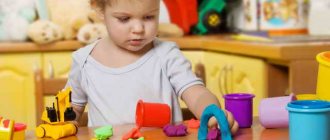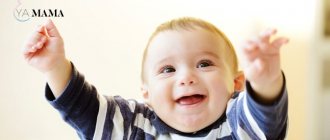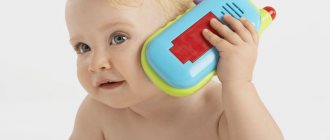Speech plays an important role in the psychological and social development of a child. Violations in this area lead to a slowdown in the formation of cognitive processes, difficulties in mastering the school curriculum, and make the child withdrawn and indecisive.
To minimize the likelihood of such problems occurring, it is necessary to know the methods of speech development in preschool children.
Stages of speech development in children from birth to school
Human speech develops in stages. Its formation begins from birth. Russian psychologist and linguist Alexey Leontiev identified a number of important stages of speech formation that a child goes through: preparatory, pre-school and pre-school.
The preparatory period covers the period of time from birth to one year, it is divided into 3 stages:
- scream _ With its help, the newborn communicates with the people around him. This is the first vocal reaction. The child uses it to tell his mother about his discomfort. Thanks to screaming, articulation, voice, and breathing are trained;
- revelry _ Lasts until six months of age. The baby reproduces certain sounds and their variations (a-gy, boo-oo, a-gu). At this stage, it is important to support the child's desire to communicate. To do this, parents should repeat what the baby says;
- babble _ This stage lasts up to a year. It is the final stage of preparing the baby for full speech. Children begin to pronounce repeated syllables (ma-ma, va-va, ba-ba, yes-da, pa-pa). At first, the child pronounces simple words unconsciously. But by 10-12 months, children begin to meaningfully use “ma-ma”, “ba-ba”, etc.
The pre-school stage begins when infants begin to consciously pronounce their first words. It lasts from 12 months to 3 years. Children's first words are general in nature. For example, “give” can mean a request, a desire, or an object. Therefore, only family members understand the baby for now.
From the age of one and a half years, children begin to pronounce words in full, and not in a truncated form. The lexicon continues to expand. Kids try to put simple words into sentences without prepositions. For example, “Masha am-am” means that Masha is hungry. By the age of three, questions are formulated in speech: “How?”, “Where?”, “Where?”, “When?”.
Children under three years old actively use gestures
The child learns to use prepositions, agree words in case, number, gender. Four-year-old children already communicate using complex and compound sentences. The preschool stage of speech formation lasts from 3 to 7 years. This is a time of active replenishment of the vocabulary.
By the end of the preschool period, children pronounce all sounds correctly and have a broad outlook.
Methods of speech development in kindergarten
The theory and methodology of speech development in preschool children has its own characteristics. There are many techniques for teaching kids. One of the most popular is the method of Alekseeva M.M. and Yashina V.I.
The technique involves step-by-step speech training:
- filling the vocabulary;
- correct sound reproduction;
- grammatical construction of sentences;
- training in conducting monologues and dialogues.
In the method of speech development by V.I. Yashina. The following methods are used:
- verbal (carried out through conversations, reading, stories);
- visual (implemented through examination of objects, familiarization with drawings, photographs);
- practical (these are theatrical games, drawing, designing, round dances).
Methods of speech development by Yashina V.I. and Alekseeva M.M. involves the use of such verbal techniques:
- speaking;
- sample of speech communication;
- repetition;
- indication;
- explanation;
- question.
Reading fairy tales and short stories is a great way to improve your vocabulary
Groups in preschool educational institutions are divided into junior, middle and senior. The thoughtful speech of a specialist is used as a role model. To motivate the child to actively communicate, the teacher emphasizes his positive qualities and achievements. It is customary to correct vocabulary errors correctly and accurately.
In younger groups
The method of developing children's speech involves mastering words, understanding their meaning, and association. In younger groups, as a rule, classes are conducted in the form of a game. Memorizing words occurs when studying the world around us, looking at drawings, toys and other objects.
At this time, the teacher pronounces sounds, associating them with a specific object. Auditory exercises alternate with articulation exercises. To train the speech apparatus, the teacher asks the children to smile, stick out their tongue, run it over their upper teeth, and then puff out their cheeks.
The method for three-year-old children is aimed at teaching the correct pronunciation of sounds. Children learn to hear and pronounce consonants and vowels. Children often confuse hissing and dull sounds and miss them.
In kindergartens, deduction games are often played: “Brew tea”, “Guess what they hid”, “Cut salad”, etc. During such activities, the child learns not only to talk, but also to perform actions with objects. Also, the teacher’s task is to create associations for the correct formation of speech. For this purpose, quantity games are played.
In middle and senior groups
In the middle and older groups, a method for comparing and correcting speech disorders is used. Repeated repetition of a verbal element gives the child the opportunity to remember the sound and learn to pronounce it correctly. The teacher explains the essence and meaning of various phenomena and objects. This allows you to remember words faster.
The specialist’s task is to consolidate the acquired skills and form conversational speech in the child. Kids are encouraged to conduct a coherent dialogue, listen and maintain a conversation. Simple lessons on relationships and sentence structure are taught.
To construct morphological speech, the following techniques are used:
- reading literature;
- learning poetry;
- staging theatrical scenes.
Methods of speech development by Starodubova N.A. involves conducting collective training sessions aimed at developing perseverance, assessing speech level, and creative qualities. In middle and senior kindergarten groups, children communicate a lot with their peers, use speech patterns and skills. Participation in games for older children contributes to the rapid development of speech.
But such an association must take place under the control of educators. After all, some older guys can tease and offend kids, laughing at their still unpracticed speech. This negatively affects the development process. Children's vocabulary is replenished through descriptive stories. The methodological system makes it possible to develop imagination and memory.
Games described include:
- examination of the subject;
- highlighting its special features;
- determining the components of an object relative to each other;
- finding small components;
- re-perception.
Six-year-old children should be able to recreate images of things in their memory when answering questions from the teacher. Kids are able to rhyme words, compose simple rhymes, and compose logically meaningful stories.
The importance of children's language development
In young children, language development coincides with the development of thought. Cognitive skills are next to language skills, so a child who puts effort into language development will also be diligent in studying other academic subjects and areas of development.
Language is communication, both expressive and receptive. Expressive language is spoken or communicated using sign language. Receptive language is speech or information that is conveyed or understood.
The influence of speech on writing and reading
Language and literacy (writing and reading) develop together. Early language and literacy skills develop several years before a child starts school and needs social interaction and an environment that engages the child. Previously, experts believed that a child's development of language skills occurred at random, and then only literacy was acquired. However, we now accept that these skills are interrelated and that the child does not develop them in isolation from others.
The influence of speech on school success
The development of a child’s speech directly affects his success in school. This is one of the best ways to predict what he will do in school. When a child has outstanding language skills, it affects all other academic subjects. Essentially, reading has a lot to do with print, and a child is able to perceive these written symbols and attach meaning to them due to early language development.
The influence of speech on emotional development
Language development is also important in a child's ability to express and communicate emotions. It starts with the babbling and cooing of the baby and the bond that is built between the baby and his caregivers. Early speech consists more of cries expressing needs and gradually gives way to more verbalization. When a child's language development improves, there are usually fewer emotional outbursts and tantrums. A child who can express emotions through words will have an easier time coping with school and academic tasks and will be more successful in the school social environment.
Ushakova's technique
Ushakova’s method for developing the speech of preschool children is quite well-known and effective. It is based on the assimilation of simple material and elementary techniques, followed by a transition to more difficult classes.
Complicating tasks for the baby is carried out gradually and imperceptibly. After just four lessons you can see positive results in speech development.
Parents play a major role in the development of a baby’s speech, so mothers are given the following recommendations:
- talk to your child correctly;
- ask the baby to repeat simple words;
- during the game, name objects;
- regularly tell fairy tales, read children’s books aloud;
- If the child pronounces words incorrectly, try to correct the mistakes.
Ushakova’s technique involves an individual approach. When developing the program, the health characteristics, genetics, level of development, age of the baby, his skills and abilities are taken into account.
Speech exercises
To develop speech, it is recommended to perform special exercises. Classes can be conducted in the form of a game to interest the child.
Effective speech exercises:
- searching for an item. At least three toys are placed in front of the baby. They ask him to turn away and at that moment they hide one of the things. Then the adult offers to name and describe what item is missing;
- comparison of pictures. Show your child a drawing of animals. Ask him to conduct an analysis. For example, a giraffe is big and a dog is small;
- imitation of the voices of birds and animals;
- memorizing tongue twisters, pure tongue twisters;
- names of objects in singular and plural;
- description of a fairy tale from a picture;
- search for words starting with the given letter;
- rhyming words.
Monologue speech
The statement of one person addressed to listeners is called monologue speech or monologue.
Signs of this form of speech:
- duration;
- volume;
- structure;
- easily changeable topic of the statement.
There are two types of coherent monologue:
- addressed to listeners (report, lecture, public performance);
- addressed to oneself, i.e. not expecting a response.
Mastery of monologue speech requires certain skills:
- the use of speech structures to intelligently express one’s thoughts;
- narrative and descriptive messages on a topic using story pictures;
- compiling descriptive texts according to the plan.
Methods for developing monologue speech
The method of teaching coherent monologue speech involves:
- formation in students of certain skills of expressing their thoughts with the help of learned materials;
- improving skills with support exercises.
Any type of monologue - story, description, retelling - requires some kind of support.
By support we mean:
- situations;
- prepared material (questions, descriptions);
- ready-made texts;
- visual situations;
- ready-made structures;
- logic.











